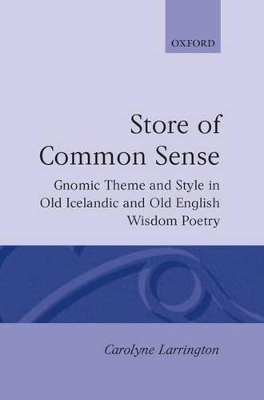Oxford English Monographs
1 total work
A Store of Common Sense is the first comparative study in English of Old Icelandic and Old English wisdom poetry. It examines problems of form, unity, and coherence, and how the genre responds to social change, both reflecting and shaping the thinking of the communities which originate it.
Carolyne Larrington analyses the differences between the pagan wisdom of Norse, ranging through everyday practical advice, rune magic, and spells, and the Christian, socially oriented ideals of Old English wisdom poetry, strongly rooted in Christian concepts of `natural' order and hierarchy in God's Creation. Close reading in primary texts, both runic and magical, lays bare the skilful, structural integration of pragmatic, social wisdom with other kinds of knowledge.
The book explores the possibility of Christian influence on Norse texts and demonstrates the impact of Christian learning on the ancient pagan genre. The existence of a gnomic `key' in Norse and English narrative verse is also shown.
Far from being platitudinous moralizing, the wisdom poets of the two literatures reveal themselves as comic, ironic, dramatic, and grandiose by turns, exploring a gamut of themes unequalled in any other genre of the period.
Carolyne Larrington analyses the differences between the pagan wisdom of Norse, ranging through everyday practical advice, rune magic, and spells, and the Christian, socially oriented ideals of Old English wisdom poetry, strongly rooted in Christian concepts of `natural' order and hierarchy in God's Creation. Close reading in primary texts, both runic and magical, lays bare the skilful, structural integration of pragmatic, social wisdom with other kinds of knowledge.
The book explores the possibility of Christian influence on Norse texts and demonstrates the impact of Christian learning on the ancient pagan genre. The existence of a gnomic `key' in Norse and English narrative verse is also shown.
Far from being platitudinous moralizing, the wisdom poets of the two literatures reveal themselves as comic, ironic, dramatic, and grandiose by turns, exploring a gamut of themes unequalled in any other genre of the period.
